…Awori – The Autochthonous Yorùbá Subgroup.
LAGOS vs LAGOS STATE – Demography
There’s difference between Èkó, Lagos and Lagos State.
Èkó: Lagos Island
For comprehension, Èkó, the domain in which Ọba Rilwan Aremu Akiolu is the traditional head belongs to Awori Chief, Aromire.
It is the space from Obalende to Idumota (that is Lagos Island).
In history: It was established by Aromire as Pepper Farm hence The Palace of Ọba of Lagos is Iga Iduganran.
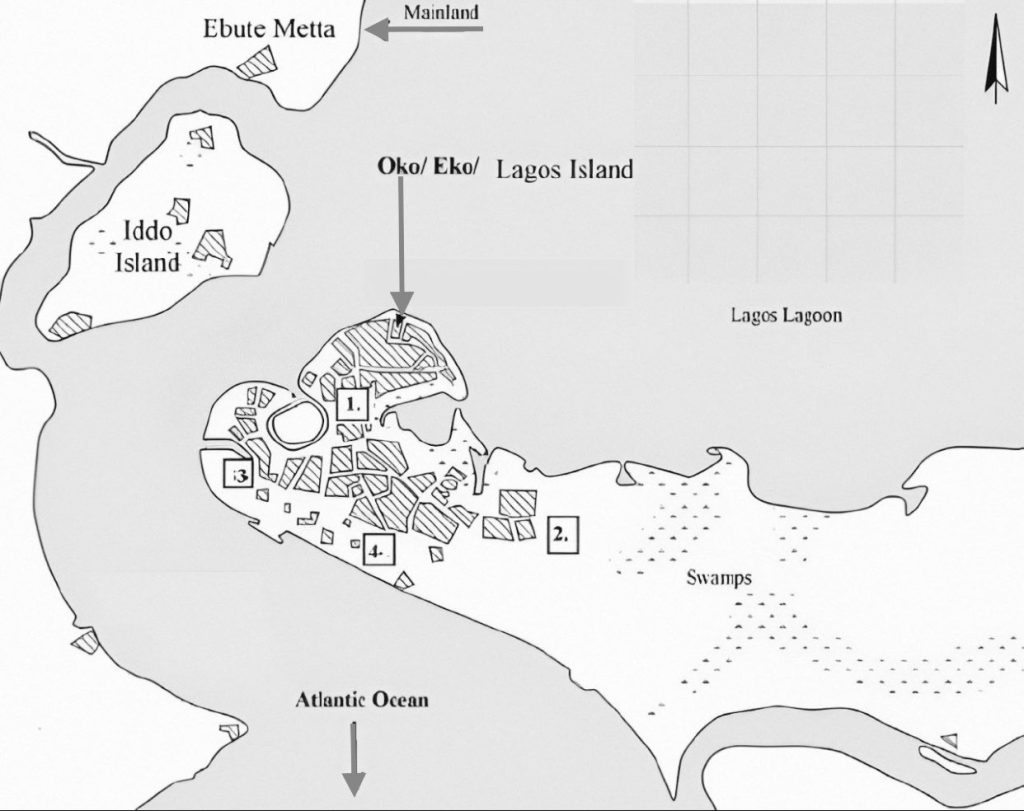
LAGOS: Federal Capital Territory
This is different from Lagos which starts from Victoria Island, Lagos Island (Èkó), Lagos Mainland up to Jibowu, Apapa, Surulere up to Akangba.
This was the Federal Capital Territory of Nigeria created by the colonial masters, before Lagos State was created.
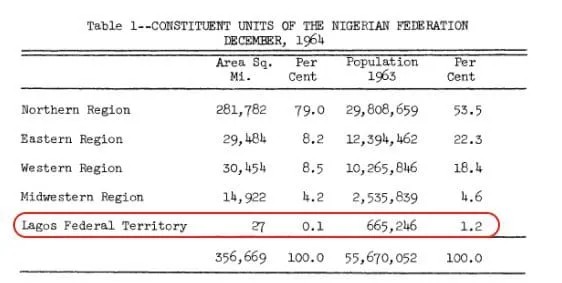
LAGOS STATE: Created in 1967
Lagos State on the other hand consists of the entire Lagos and its colonies of Badagry, Epe, Ikeja and Ikorodu which were formally under the Old Western Region.
LAGOS COLONY:
Lagos colony not “Lagos State” wasn’t part of Southern Nigeria until 28 February 1906, In this new region called Southern Nigeria, the old Lagos Colony became the Western Province with Capital in Lagos and the former Southern Nigerian Protectorate was split into a Central Province with capital at Warri and an Eastern Province with capital at Calabar.
By the Act of the Legislative Council of the 12th November 1895, signed by George C Denton, Acting Governor and pursuant to Ordinance №5 of 1890, Ilaje territory earlier described up to the estuary of the Benin River in the east effectively became part of the Lagos Colony.
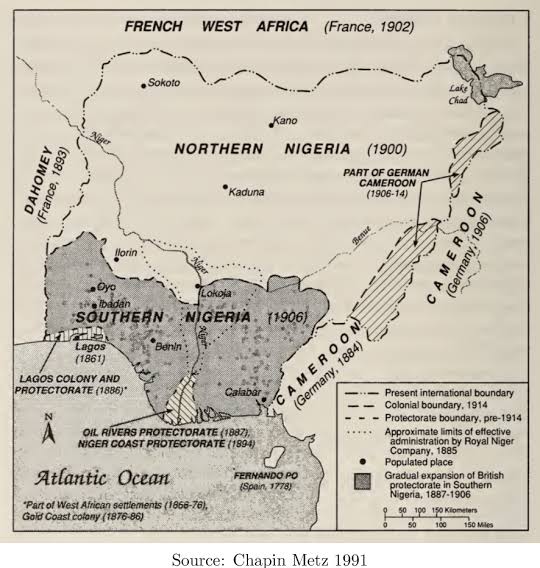
Today Lagos is a crowded, cosmopolitan city of several million inhabitants. Its names reflect its past; to the Yorùbá it is Èkó, deriving from Yorùbá word/Awori dialect – Ereko.
I.e farmstead, plantation, province, dependent districts or town
Ereko simply means settlement of the farmlands(oko) under the ownership/control of another neighboring settlement. The settlement in this context is “IDDO ISLAND” Eventually, eko became independent of iddo at the rise of Ashipa in Lagos
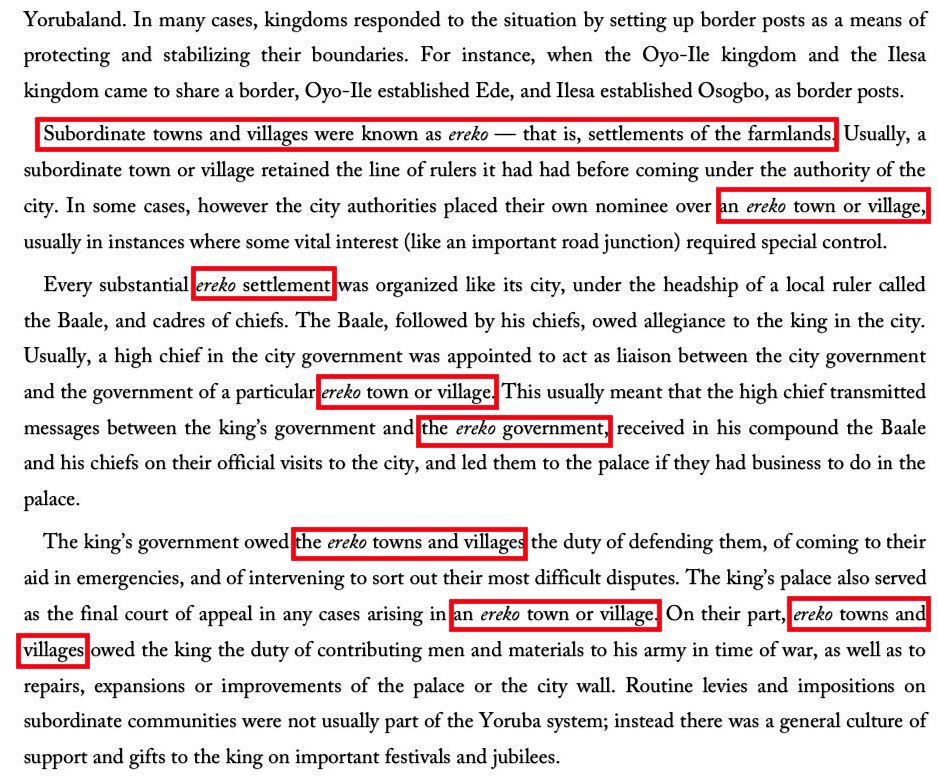
Known as Ereko by the natives, though alternatively to other people and to the rest of the world it is Lagos, contracted from the Portuguese Lago de Curamo (the name Kuramo survives for an inlet of the great lagoon nearby), while there are traces of yet another, probably later but now almost forgotten name, Onim or Aunis, apparently also used by the Portuguese.
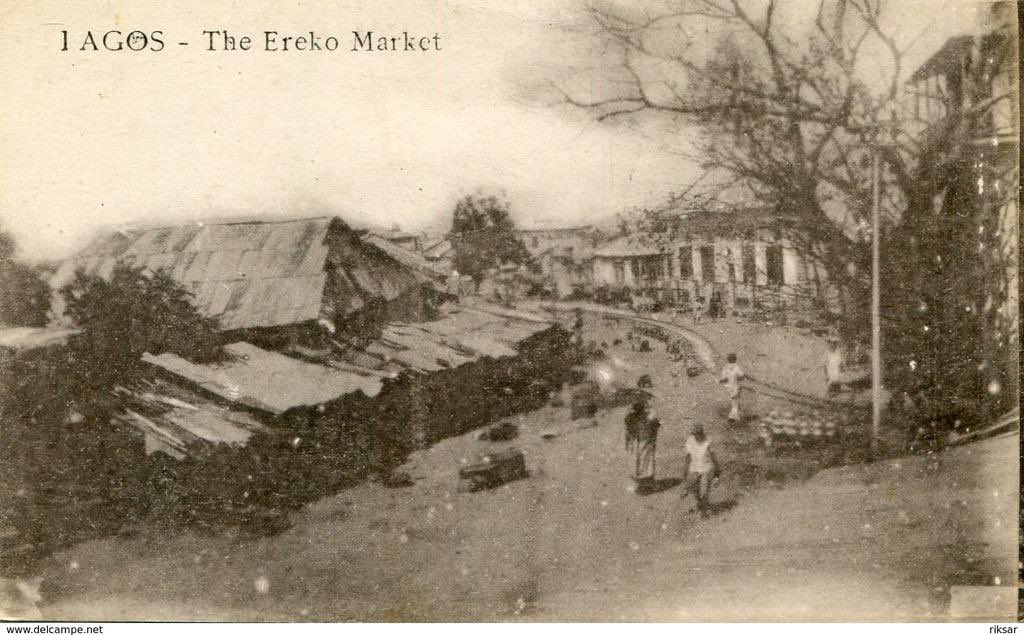
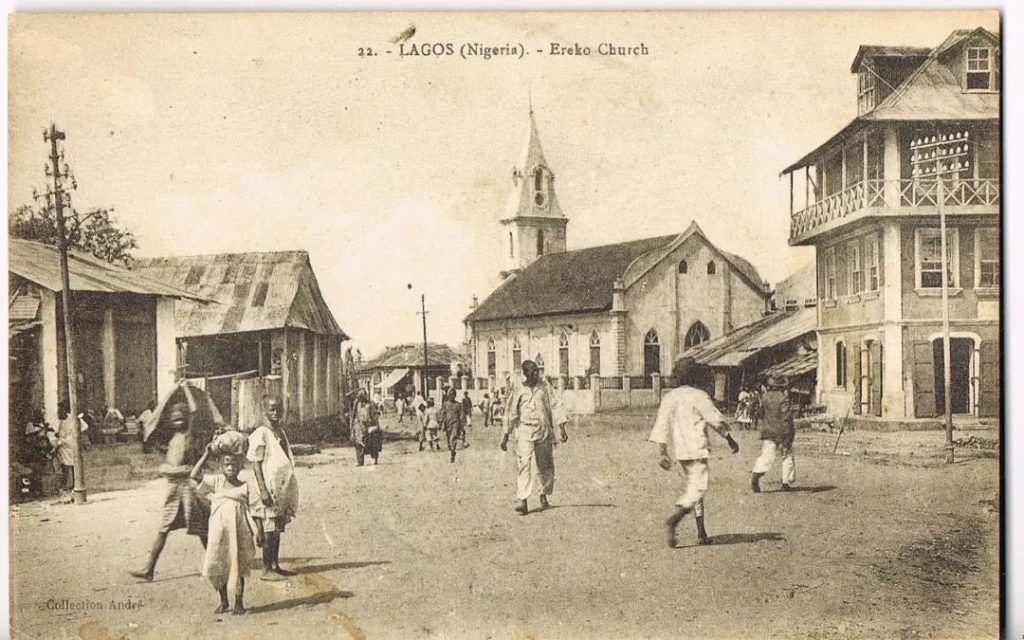
Lagos Foundation
According to the traditions of the Èkó kingdom, its people first settled at a place called Iseri – homeland of all Awori, a small settlement of mostly hunters and fishermen on the lower bank of the Ogun River, some distance southeast of Otta and a few miles inland from the coast.
To this place, a prince named Ògúnfunminire came from Ifè and was accepted as King.
Trade was beginning to grow in the coastal lagoons, trade eastwards with the coastal Ijebu and westwards with the villages of the Aja coast.
In order to be able to catch more of this trade, most of the Iseri people, led by their king, undertook a series of relocations that brought them closer to the lagoons, leaving at Iseri a small remnant that has kept that little village alive till our times.
The main body spread to Ebute Meta, then to the edge of the lagoon at Iddo, and finally to the biggest island in the area, Èkó Island.
Here, incorporating into their community the scattering of other Awori natives already living on the island, they established the permanent home of their kingdom, the Èkó kingdom under their King who bore the title of Olofin on whose death the land was divided among the ten eldest of his thirty-two sons, these ten chiefs being the ancestors of the Idejo, ‘owners of the land’.
The senior of these, Aromire (‘friend of the water’), had his farm at Isale-Eko (meaning ‘under’ or, in modern use, ‘downtown’ Lagos). The present aafin of Lagos is situated on this site and is called Iga Idunganran, ‘the pepper palace’, a recollection in the Lagos Awori dialect of the pepper on Aromire’s farm.
Formation of Èkó into a Polity – Benin Element, c.a 1550
“A series of attacks had now been launched against Lagos by the armies of Benin.
At first these were repulsed under the leadership of the Olofin.
After the Olofin’s death, however, the Bini succeeded in establishing themselves on Iddo island under Asheru, one of their warriors.
“The impression given by Lagos tradition is that this was achieved by peaceful infiltration rather than by CONQUEST”
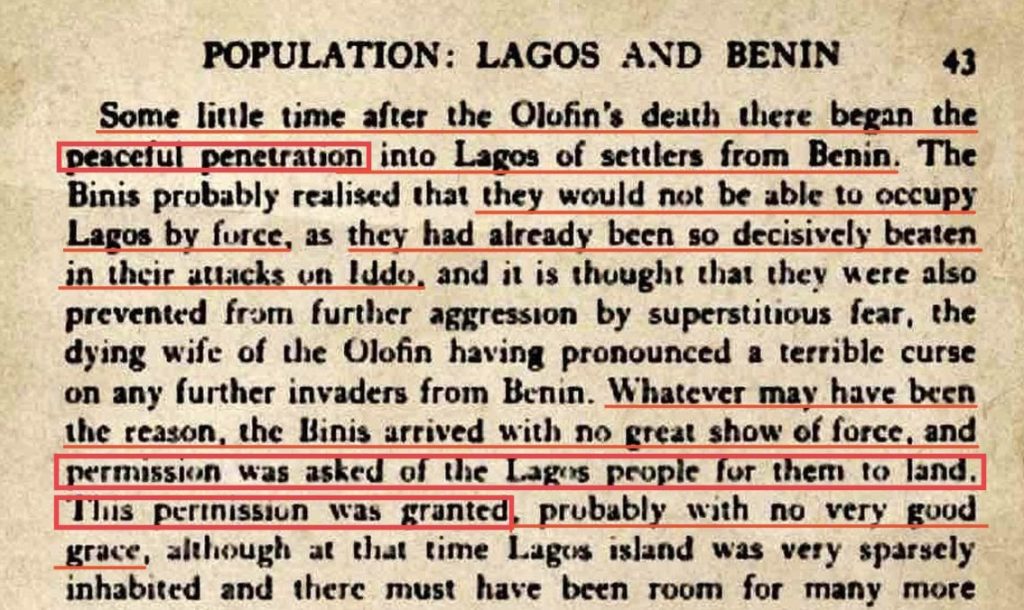
According to the traditional history of Benin as related by Egharevba, Ọba Orhogbua of Benin, campaigning in person, made a war-camp on Lagos island which he used as a base for extending his control over the area.
An early corroborative account is provided by the German, Josua Ulsheimer, who visited Lagos in 1603 and who described the island as a military camp occupied by the soldiers of the King of Benin and governed by four of his generals. Some time later, it seems, the Òbà appointed a ruler for Lagos to represent the interest of Benin and to forward tribute there.
“The man chosen is named in both Lagos and Benin traditions as “Ashipa“.
The Lagos account is that the Bini warrior “Asheru” died while campaigning on the mainland nearby and that “Ashipa, an Isheri chief and (like Ogunfunminire and the Olofin before him) of the Ifè royalty”, carried his body home to Benin, thereby gaining such favour with the Ọba that he was sent back to Lagos as its King.
Ashipa founded a new dynasty which continued to rule Lagos, using the title either of Ologun (contracted from Oloriogun, ‘warrior’ ), until Esugbayi era, he started the title of Eleko
However, Neither Ọba of Lagos/Ologun/Oloriogun/Eleko own the land, The land owners are the Idejo Chiefs.
The dynasty’s dependence on Benin was emphasized by the appointment of another chief, the Eletu Odibo – still one of the Akarigbere, or kingmakers of Lagos – who alone had the right to crown the Ọba and who in early times probably maintained close connection with Benin.
Meanwhile, the senior descendant of the Olofin, the Oloto, maintained a nominal independence as ruler of the northern corner of Iddo island and as first among the Idejo.
The extension of the rule of Benin to Lagos and its neighbourhood has been gradually assigned to the sixteenth century, possibly associated with the use of firearms.
Is Èkó (derived from Ereko), a Edo/Bini or Yorùbá word?
Did Benin assign the name to the land?
This question is already answered above, however to further corroborate and affirm this, here are other proofs
Ruy de Sequiera Visit to Èkó, 1472
” He recorded this in 1472AD, and that is 100 years before the Edos/Binis immigrated to live on the island among the Yorùbá autochthones.”
His “Koráme”/“Curamo” messy spelling (of the island’s local name) corresponds to no else than Èkó Aromi-rẹ which is the islands local name.
This description first came from Ruy de Sequiera who explored the island area around the year 1472.
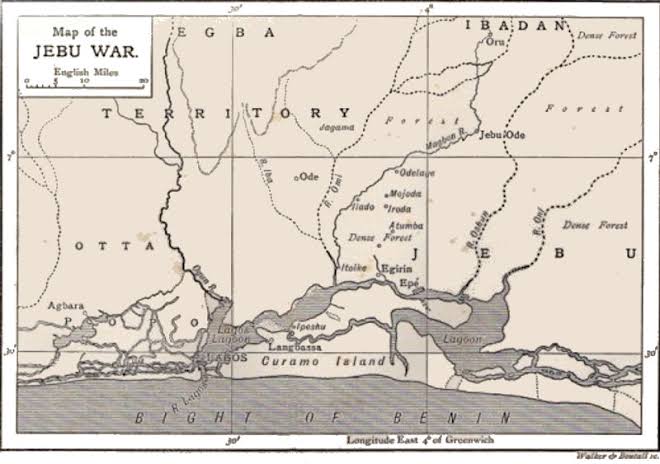
Ọba Orhogbua lived in mid 1550s.
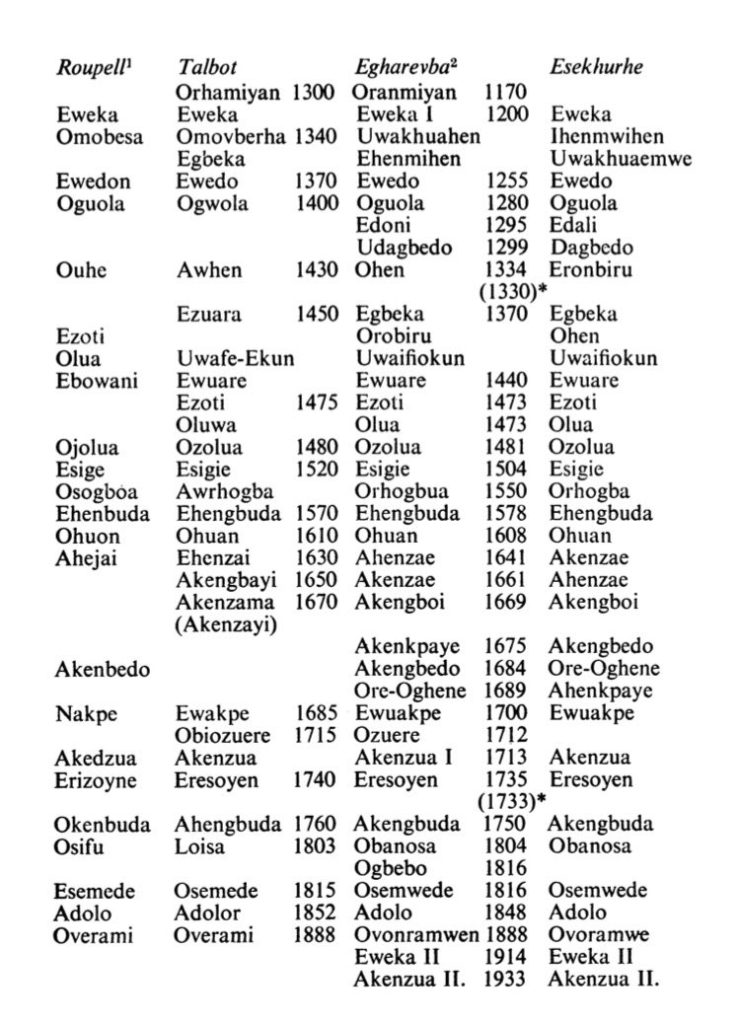
Other Towns/Cities With Name Èkó In Yorùbáland:
The Èkós of the Yorùbá Homeland.
- Èkó-Ènde (Ìfẹ́lódùn LGA, State of Ọ̀ṣun)
- Èkó-Àkéte (Lagos Island LGA, Lagos State)
- Èkó-Àjàlá (Ìfẹ́lódùn LGA, State of Ọ̀ṣun)
- Èkó – Efun ( Amongst The Olukumi of Delta state)
- Èkó Tedo, Òyó State
Ifá Verse on Èkó
There’s atleast one ODU IFÁ that mentioned Èkó
Culled from: Oluwo Jogbodo Orunmila
Owonrin méjì
“The birth odu of èkó (Lagos Island)
Eko is from odu Ifá owonrin meji ( it the red feather of parrot)
Eti osa means by the lagoon
Osa or osara is lagoon according to odu Ifá irete ogbe.
” ÈKÓ KO WON YUN
ÈKÓ KO WON BO
ADIFA FUN ORUNMILA NIJO TI BABA NSAWO LO SAGBAIGBO IFE OLUKIRIBITI
EBO NI WON PE KI BABA O SE
O GBO EBO NBE O SI SEBO
NJE EKO KO WON YUN O
EKO KO WON BO
ODE TAWO BALO ALOBO NI
Refu-refu Landana eyin, Gbangba Lakiribiti, Adifa fun OSARA Tin se Olori Omi Lale Ife, Wonni ko karanle Ebo lawope kose,
Olomo Lolaye, Osara mo komode ooooo.”
Ashipa Descendant – Ado Dynasty
Ashipa got rewarded with a tribute collection power for taking the corpse of Aseru, the Bini representative back home.
The Akarigbere accompanied Ashipa back to Lagos to look out for the Oba’s interests.
An Igbe song for Lagos Obas mentioned ” Awuse ” as the name of the Benin princess who was given to Ashipa as wife. Igbe is a traditional music in Lagos.
Ashipa was an Awori married to a Bini princess. He would not invade Èkó, his ancestors’ land.
Begining:
The son from the marriage is ” Ado “, he was born in Benin palace and trained in Benin Royal court.
Ado returned and became first Ọba of Lagos.
End: After Ado reign, Gabaro became the Ọba, after Gabaro, Akinsemoyin reigned, however, he could not get a male heir.
Ologun Kutere Dynasty, 1700s
Ifá priest of Ijesa Origin to Ọba Akinsemoyin whose name is Alagba married Ọba Akinsemoyin daughter – Erelu Kuti.
The Son from the marriage is named Ologun Kutere.
Ologun Kutere is the ancestor of Lagos Ọba ruling houses till date.
Ologun Kutere had three sons – Eshilogun, Adele, and Akintoye.
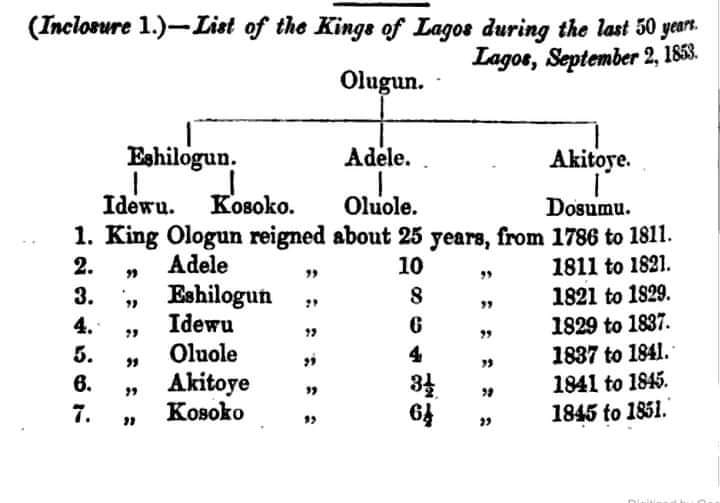
Etymology – Ereko, Èkó
Èkó:
The oldest texts on its origin admit it is of Yoruba origin. E.g. D’Avezac (1845), Wood (1878), Burns (1929).
A curious dig into the language and culture of Yorùbá and the island’s traditional accounts reveal this.
This island first served as ‘farmland’ for the adjacent Ọ̀tọ̀-Ìdó —the then actual town & seat of govt. in the area.
From ‘oko’ (‘farmland’), this island gradually acquired the shape of an ‘eréko’ (i.e. a “farmstead district”).
In time, Arómirẹ́’s ‘eréko’ lent itself in the contracted form ‘èkó’ (like ‘òṣà’ contracted from ‘òrìṣà’) to be the name of this outpost of Ìdó.
By circa-1600, Èkó had become a trade-magnet, drawing different trade groups who’d come there to camp & seize trade opportunities.
” The term ‘èkó’ would thus find its way (since circa-1570s) into the Edo lexis, via the Bini group which also came to ‘camp’ there then.
The term ‘eréko’ derives from ‘erí’ & ‘oko’, namely: ‘atop’ & ‘farm’.
Arómirẹ́’s farmhouse was built upon an ‘oko’, apparently.
It is only in Yoruba that ‘èkó’ find its literal/etymological derivation.
Culled:
Kingdoms of the Yorùbá, Robert S. Smith, 3rd Edition
The History of the Yorùbá People, Prof S Akintoye.
D’Avezac (1845)
Wood (1878)
History of Nigeria, Alan C burns, 1929
Modern and traditional elites in the politics of Lagos,1975
Ifá Verse
The Yorùbá: A New History by Prof Akin Ògúndiran
Jacob Egharevba ( Benin Historian)
Josua Ulsheimer, 1603
Ruy de Sequiera, 1472
Proceedings of the Royal Geographical Society and Monthly Record of Geography, New Monthly Series, Vol. 12, No. 10 (Oct., 1890), pp. 596-614
Igbe Traditional Song
Etc
